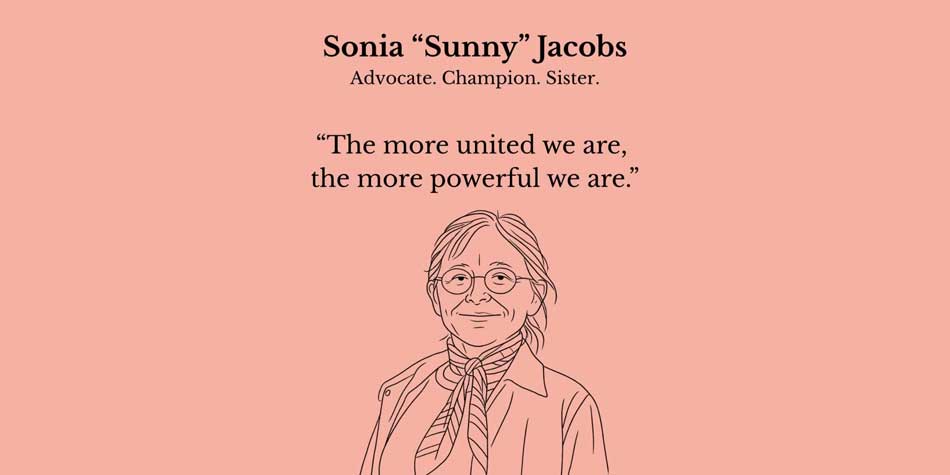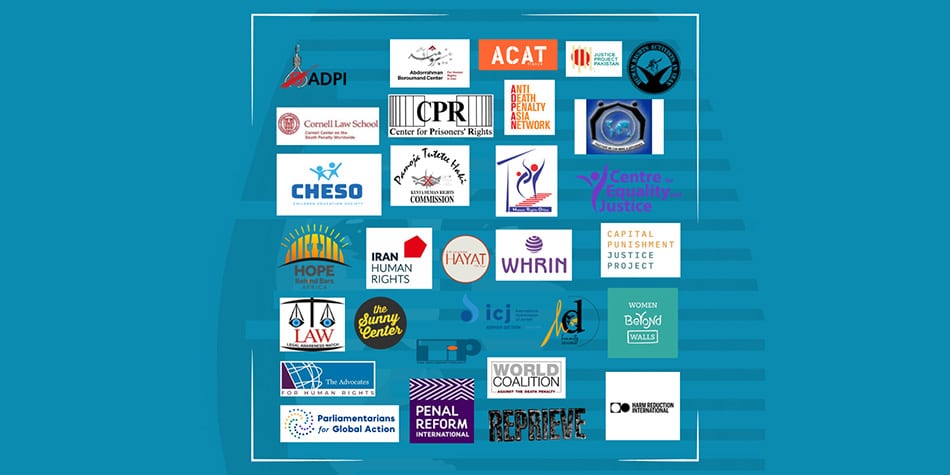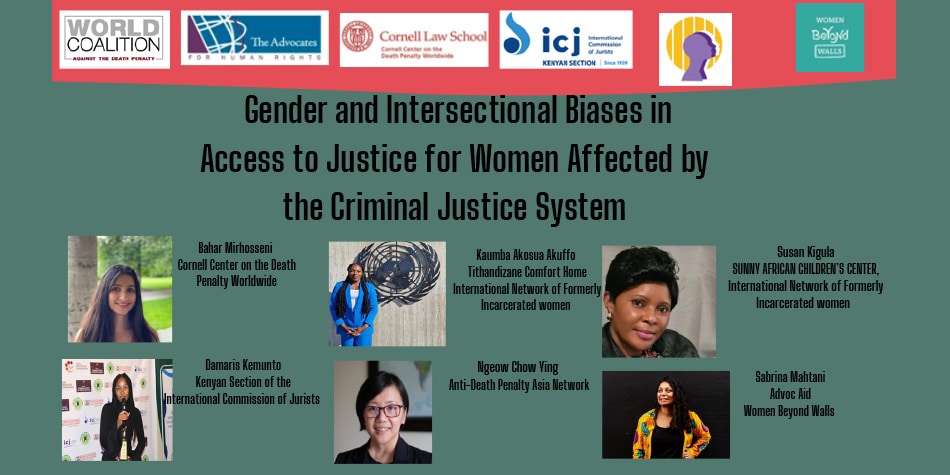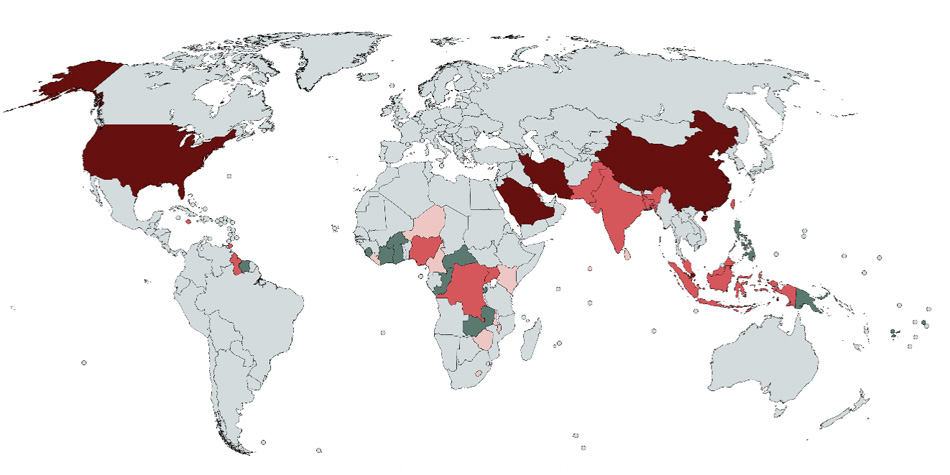
Abolition of the death penalty at the United Nations Human Rights Council 49th session
Advocacy
The 49th session of the UN Human Rights Council took place from 28 February to 1 April 2022. If you missed it, here’s what happened in relation to the abolition of the death penalty!
Setting the scene
This 5 week-long 49th session was very difficult and very long. Many called it a marathon, as the March session is usually 4 week-long and the other sessions 3 week-long. The international context was also particularly difficult with the war in Ukraine. The UN General Assembly adopted a resolution calling for Russia to be suspended from the Human Rights Council one week after the end of the session, but there was a lot of tension around this issue during the session in Geneva.
This session was also the 1st session to resume gradually in person since the breakout of the COVID-19 pandemic two years ago. However, no side event could take place in person and NGOs have complained about a lack of access to informal consultations for the resolutions. On the brighter side, NGOs have stressed the importance of remote participation for NGOs not based in Geneva, especially for under-resourced and underrepresented NGOs. The Human Rights Council President for 2022, Ambassador Federico Villegas from Argentina, said that some modalities put in place during the pandemic will stay because they are more efficient and more participatory. He also pledged to support civil society engagement.
During the debates
During the Human Rights Council’s High-level Segment, Russia’s attack on Ukraine dominated the discussion, however, some UN Member States seized the opportunity to also speak about the Death Penalty. This was notably the case of Alfonso Nsue Mokuy, Third Deputy Prime Minister of Equatorial Guinea who said that Equatorial Guinea’s Penal Code provided for the abolition of the death penalty. Yvonne Dausab, Minister of Justice of Namibia, said that states should reconsider the imposition of the death penalty. Francisco Andre, Secretary of State for Foreign Affairs and Cooperation of Portugal, said that his country’s priorities were the elimination of the death penalty and the protection of women’s rights. Mukhtar Tileuberdi, Deputy Prime Minister and Minister for Foreign Affairs of Kazakhstan, said that Kazakhstan’s priorities were gender equality, abolition of the death penalty and freedom of belief.
The death penalty was also an issue of concern during the General Debate on Human Rights Situations that Require the Council’s Attention. UN Member States said that the death penalty was a grave violation of human rights. There should be fair trials and an end to arbitrary detention for all prisoners. Human rights should not be politicized, regardless of national conditions. The United Nations must listen to the voices of those who were condemned to death and ensure that all could live lives without being tormented by the fear of State-mandated death.
The death penalty was also mentioned during the Interactive Dialogue with the Special Rapporteur on the Situation of Human Rights in the Democratic People’s Republic of Korea, during the Interactive Dialogue with the High Commissioner on the Situation of Human Rights in Myanmar, during the Interactive Dialogue with the High Commissioner for Human Rights on her Report on the Situation of Human Rights in Belarus and during the Interactive Dialogue with the Special Rapporteur on the Situation of Human Rights in Iran.
Civil Society Joint Oral Statements on the Death Penalty
- Democratic Republic of the Congo: Joint statement by ECPM, CPJ, FIACAT and the World Coalition for the Enhanced interactive dialogue on oral updates on the DRC. Watch it on UN Web TV. The Deputy High Commissioner reiterated her opposition to the use of the death penalty in all circumstances. Noting the de facto moratorium on the imposition of the death penalty in the Democratic Republic of the Congo, she called on the authorities to maintain this moratorium and to consider abolishing it in law.
- Iran: Joint statement by ECPM, Kurdistan Human Rights-Geneva, Iran Human Rights, the Abdorrahman Boroumand Center, and Impact Iran for the Interactive dialogue with the Special Rapporteur on the situation of human rights in the Islamic Republic of Iran. Watch it on UN Web TV. Javaid Rehman, Special Rapporteur on the situation of human rights in the Islamic Republic of Iran, said Iran continued to deny the mandate access to the country. The death sentence continued to be imposed for a wide range of acts, including against individuals who had participated in protests. The report also reiterated the deeply flawed processes that preceded the imposition of the death penalty, including lack of access to a lawyer and the use of forced confessions obtained under torture and without subsequent investigation into such allegations.
- South Sudan: Joint statement by The Advocates for Human Rights and the World Coalition for the High Commissioner’s Report on South Sudan. Watch it. The UNMISS Human Rights Division stated that continued to build the capacities of national civil society organizations and legal aid providers, in order to develop and strengthen their ability to protect the rights of death-row inmates through legal aid and awareness, training of justice-chain actors and advocacy for alternatives to the imposition of death sentence. This resulted in the reduction of the imposition of the death penalty.
- UPR adoption of Antigua & Barbuda: joint statement by the Greater Caribbean for Life, The Advocates for Human Rights and the World Coalition. Watch it.
- UPR adoption of Eswatini: joint statement by The Advocates for Human Rights and the World Coalition. Watch it.
- UPR adoption of Papua New Guinea: joint statement by The Advocates for Human Rights and the World Coalition. Watch it. Amnesty International also issued an statement welcoming the Papua New Guinean (PNG) parliament abolishing the death penalty in January 2022 which Amnesty sees as a direct consequence of the UPR.
- UPR adoption of St Vincent & the Grenadines: joint statement by the Greater Caribbean for Life, The Advocates for Human Rights and the World Coalition. Watch it.
- UPR adoption of Tajikistan: joint statement by The Advocates for Human Rights and the World Coalition. Watch it.
- UPR adoption of Thailand: statement by FIDH. Watch it on UN Web TV.
- UPR adoption of Trinidad and Tobago: joint statement by the Greater Caribbean for Life, The Advocates for Human Rights and the World Coalition. Watch it.
During the UPR adoption of Samoa, Peseta Noumi Simi, Chief Executive, Ministry of Foreign Affairs and Trade of Samoa, said Samoa had already abolished the death penalty and remained committed in its efforts to ratifying all core human rights treaties and its protocols in due course.
During the UPR adoption of Suriname, Kenneth Amoksi, Minister of Justice and Police of Suriname said: “Moreover, following the abolition of the death penalty in the Penal Code in 2015 and in the Military Penal Code last year, further steps were currently being taken towards ratification of the Second Optional Protocol to the International Covenant on Civil and Political Rights.”
Resolutions adopted
While there was no specific resolution on the death penalty at this session, some of them were linked to the death penalty:
- Extension of the mandate of the Special Rapporteur on the situation of human rights in the Islamic Republic of Iran for a further period of one year. Before the vote, 37 NGOs, including the World Coalition, had signed a joint letter calling on the Human Rights Council to renew the mandate of the Special Rapporteur on Iran
- Freedom of religion or belief (led by France on behalf of the European Union) – A/HRC/49/L.2 Para 9 c): To ensure that no one within their jurisdiction is deprived of the right to life, liberty or security of person because of religion or belief, and that no one is subjected to torture or other cruel, inhuman or degrading treatment or punishment, or arbitrary arrest or detention on that account. Interestingly, another resolution on a similar topic, but not mentioning the death penalty, was also adopted: Combating intolerance, negative stereotyping and stigmatization of, and discrimination, incitement to violence and violence against, persons based on religion or belief (led by Pakistan on behalf of the Organization of Islamic Cooperation) – A/HRC/49/L.5
One side event on the death penalty for apostasy and blasphemy
Few side events were organized during this session in general. It was not possible to organized them in person and a hybrid format was not an easy solution because people attending the Human Rights Council session in person couldn’t connect to online side events.
That being said, one side event dedicated to the death penalty for apostasy and blasphemy was organized by the Jubilee Campaign co-sponsored by seven different States [Australia, Chile, Denmark, the Netherlands, the United Kingdom, Sierra Leone and the United States] with the UN Special Rapporteur on freedom of religion or belief Dr. Ahmed Shaheed and Dr. Mai Sato presenting the Eleos Justice Monash University report Killing in the Name of God.







